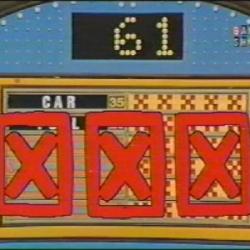Captain Cassidy wrote last month about “Bless Every Home” — a creepy Southern Baptist initiative to promote evangelism via something like data mining. The idea is church-growth by aggressively targeting and tracking every potential member in the neighborhood.
 I doubt this scheme will “work,” but even if it succeeded in persuading some neighbors to visit the church, I doubt they’ll want to stick around once they get there and learn about the databanks and dossiers their new friends have been compiling on them. “Bless Every Home” seems like it can only “work” if none of the neighbors who live in those homes learns about the existence of Bless Every Home. (For them, that wouldn’t quite be like that moment in the movie when the object of the stalker’s obsession stumbles across their creepy giant wall of surreptitious photos, but it’s in the same ballpark as that.)
I doubt this scheme will “work,” but even if it succeeded in persuading some neighbors to visit the church, I doubt they’ll want to stick around once they get there and learn about the databanks and dossiers their new friends have been compiling on them. “Bless Every Home” seems like it can only “work” if none of the neighbors who live in those homes learns about the existence of Bless Every Home. (For them, that wouldn’t quite be like that moment in the movie when the object of the stalker’s obsession stumbles across their creepy giant wall of surreptitious photos, but it’s in the same ballpark as that.)
To be fair, it’s easy to see how the folks who designed Bless Every Home ended up where they did. A local church needs to reach out to its neighbors, and how can you do that if you don’t know who they are? So who are your neighbors? Well, here’s a tool to help you collect their names and addresses, and to compile other potentially useful information about them.
But, as we’ve mentioned here before, one thing we can learn from every Jesus story is that you never want to be the person asking “Who are my neighbors?” In Jesus stories, that’s always the wrong question. It never gets answered.
Or, rather, it gets the only answer it deserves: “Who is my neighbor?” “Be a neighbor.”
So let’s say you’re part of a local church that genuinely wants to reach and reach out to your neighbors in a loving, non-creepy, neighborly way. I think there’s something for such churches to learn from the story of Horrible Michigan Judge Alexis Krot.
Krot became the main character of the day on social media a few weeks ago when video circulated of a Zoom hearing in which she berated an elderly cancer patient for failing to keep up with his yard work:
Burhan Chowdhury, 72, appeared along with his son for the Jan. 10 hearing on a ticket issued in August over some overgrowth of grass in an area outside his home in Hamtramck.
“You should be ashamed of yourself,” Krot told Chowdhury during the hearing in comments that were later posted on Facebook. “If I could give you jail time on this, I would.”
Keep in mind that the overgrown weeds had already been cleaned up long before this hearing by Mr. Chowdhury’s son, who had already assured the judge that he would be taking responsibility for the upkeep of the property while his father was going through cancer treatment.
But this meant nothing to the Dishonorable Judge Krot:
She threatened him with jail a second time near the the end of the hearing, saying: “If you come back here, you’re going to jail.”
During the hearing, Chowdhury sounded sick, wheezing as he spoke.
“I am a cancer patient, very old, ma’am,” he said. “I was then very weak. … I cannot look after this thing.”
… Despite his pleas, Krot said she would fine him $100: “Did you see that photo? That is shameful, shameful. The neighbors should not have to look at that.”
Ah, yes, “the neighbors.”
Let’s assume, for the sake of argument, that at least some of those neighbors are not like Judge Krot. Let’s assume, in other words, that they are not racist authoritarians who believe the law is a cudgel that should bind, but not protect, the elderly, the sick, and the immigrant. Let’s assume that at least some of those neighbors regard property-upkeep statutes as something intended to produce positive outcomes rather than as a pretext for petty tyranny wielded in the hopes of ensnaring the weak in harsh punishment.
Let’s assume that at least some of those neighbors were not sociopaths or irrationally overconfident nitwits supremely certain that they would never suffer illness or injury or aging for which they themselves might, one day soon, be threatened with jail time.
Where were those neighbors when Mr. C. needed their neighborly help? And why wasn’t the shameful judge also shaming them for failing to meet the basic neighborly obligation to be good neighbors?
Part of the answer there is that we’ve been trained — by automobiles, and walls and screens, and 40 years of Reaganism — to think that there’s no such thing as neighborly obligation. We’ve been taught that a being a neighbor entails nothing more than being Gladys Kravitz on Bewitched — someone who peers through the blinds disapprovingly at all those others we wish would just go away.
But another part of the answer — and maybe the bigger part — is that we cannot conceive of neighborly obligations because we do not know our neighbors, or how to know them, or how to change that. That’s what makes even clumsy, creepy, misguided efforts like Bless Every Home seem attractive.
One of my favorite short stories is the final one in the Wendell Berry collection pictured above. It’s called “Are You All Right?” and nothing much happens in that story. Two friends walk through the woods at night to check in on elderly neighbors who live on the other side of the flooding river. “All you all right?” they shout across the river. And — spoiler alert — yes, they are. So they return home. That’s it. That’s the whole story. And somehow it’s one of the most challenging and beautiful things I’ve ever read.
Alas, most of us live here in America and not in Berry’s fictional world of Port William. Our communities are nothing like the “membership” he has described and explored and brought to life in countless stories and novels and poems. Wendell Berry’s Kentucky does not — and cannot — exist in the same world as Mitch McConnell’s Kentucky, and we’re all stuck here in the latter world. In this world, it can be difficult to know the whos or whens or hows of checking in on our neighbors. We don’t head over to ask “Are you all right?” because we don’t know how to do so or if such neighborly inquiries would be welcome.
So then, let’s say you’re part of a local church and this is your predicament. What can you do?
Well, if you’re in Hamtramck, Michigan, you’re in luck. Officials in that city are keeping careful track of neighbors in need. Those officials don’t understand that this is what they’re doing, mind you — they don’t seem to understand what they’re doing at all. Those befuddled officials seem to think, instead, that what they’re doing is keeping careful track of which of your neighbors are in violation, threatening the sick and distressed with various punishments rather than offering to provide them the neighborly assistance they require.
That’s a sociopathic system and it coerces and encourages everyone working within that system to behave like sociopaths. Some of them (like Judge Krot, apparently) won’t have the strength or the decency to resist that. But many more of them will find it as gross and distasteful as you do. Like you, they would rather help than harm, even when it seems like the system won’t allow for that.
So find these people, one or more of them, and get them your phone number. Let them know that whenever there’s a complaint about someone’s overgrown weeds they can call you first before firing up the cruel machine that only knows how to punish. Let them know that you and your church are ready and able to help — that your youth group will show up with trimmers and mowers and rakes to address anything the Gladys Kravitzes might find unsightly, and that members of your church are prepared to reach out to distressed members of your community to see if they’re all right without resorting to crude, unhelpful punishments like fines for the financially stressed or threats of jail time for the sick.
(I’ve never been the pastor of a local church, but I have worked for a local newspaper. And I suspect that there’s a sense in which the job of a pastor, or of a congregation, is something like the job of a local reporter: You’re only as good as your sources.)
In any case, “Are You All Right?” is a far better question to be asking your neighbors than “Would you like to join our church?”
And it’s always, always, always a better question to be asking than “Who is my neighbor?”












